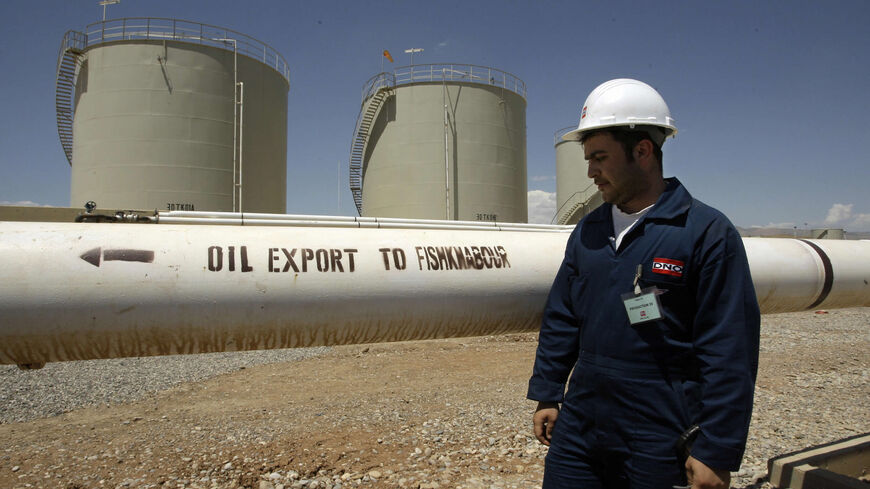Iraq’s passage of a federal budget this month could have significant ramifications for the country's oil sector as well as the autonomous Kurdistan region.
Iraq’s Council of Representatives, or parliament, passed a record $153 billion budget on June 12. The budget uniquely covers the years 2023 to 2025, includes sizable spending on development and infrastructure projects, and plans to add tens of thousands of public sector jobs. The budget was finally passed after months of political battles, involving tense debates over the oil revenue split between the federal government in Baghdad and the Kurdistan Regional Government (KRG).
For comparison, the 2021 budget amounted to $89 billion. Iraq did not pass a budget amid the political instability of 2022, prompting the government to pass emergency legislation to fund certain provisions.
The budget is based on an oil price of $70 per barrel and exports of 3.5 million barrels per day, including 400,000 barrels from the autonomous Kurdistan Region. It allocates 12.6% of federal funding to the KRG, according to reports.
Iraqi Prime Minister Mohammed Shia al-Sudani said that his government would review amendments that were made to the budget bill prior to its passage to ensure they conform with the government’s “approved ministerial program,” the official Iraqi News Agency reported on June 12. On Wednesday, Iraqi President Abdul Latif Rashid ratified the budget.
The budget is expected to have important ramifications on the oil sector. For years, the KRG and Baghdad have fought over oil revenue and the region’s independent oil exports to Turkey. Past budget disputes regarding the KRG’s oil sector have led to tensions between Erbil and Baghdad. In 2020, Iraq cut federal budget contributions to the KRG after Erbil failed to turn over the 250,000 barrels per day stipulated in the 2019 budget.
The situation escalated in March when Turkey stopped its oil imports from the Kurdistan Region after a ruling by the Paris-based International Chamber of Commerce that said Turkey owed Iraq $1.5 billion for receiving unauthorized exports. In April, the KRG and the Iraqi federal government announced that they reached an agreement whereby Iraq’s state oil company, SOMO, would market the Kurdistan Region’s oil. The regular oil flows of about 450,000 barrels per day from the Kurdistan Region were expected to resume after the April agreement, and Iraq formally asked Turkey to resume the oil flows in May. This has yet to occur, however. Iraqi and Turkish energy officials held talks on Monday, but failed to resolve the issue, Reuters reported.
The current budget may lead to more federal control over the KRG’s oil in light of the April agreement. Emily Hawthorne, senior Middle East and North Africa analyst at the US-based risk intelligence firm RANE, said that the oil-for-funding arrangement per the budget is more “codified” as a result, and that the KRG will need to turn over the oil this time.
“In general, the budget passage is good for the oil-sharing agreement and the prospects for the oil agreement actually being implemented,” Hawthorne told Al-Monitor. “The KRG really has to hand over the 400,000 barrels a day to SOMO in order to get any of that money from the budget.”
Kurdish affairs expert Wladimir van Wilgenburg wrote for S&P Global last week that many Kurds feel the budget "paves the way for Baghdad to take more control over the region's oil exports and budget and could complicate plans to revive shuttered crude production." Wilgenburg also pointed out that the Kurdistan Region is unable to pump the 400,000 barrels per day stipulated in the budget with exports to Turkey stopped.
The pricing of oil at $70 a barrel in the budget will determine how well Iraq can fund the government. Oil revenues accounted for 85% of the previous budget, according to The World Bank. The price of Brent crude oil, considered the global benchmark for oil prices, has been above $70 a barrel throughout the year, hitting a low of $71.84 on June 12, according to market data.
Hawthorne said that oil prices remaining above $70 a barrel is important for Iraq with regards to the budget.
“If oil stays above $70 a barrel, it’s great and they can fund what they want. The problem is if oil goes lower than that, then the deficit goes higher and there is a lot of vulnerability, more debt burden on the Iraqi government,” said Hawthorne.







